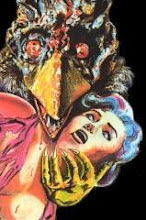 “Northanger Abbey” is re-airing on Masterpiece Classic on PBS tonight. It originally showed in their superb “The Complete Jane Austen” season in 2007.
“Northanger Abbey” is re-airing on Masterpiece Classic on PBS tonight. It originally showed in their superb “The Complete Jane Austen” season in 2007. This adaptation is excellent. I cannot say that enough. Catherine Morland is a country girl who is marked by extreme naiveté. She goes to bath and meets a gentleman (who, to her delight, is an expert is muslins!) by the name of Henry Tilney. Mr. Tilney is a stereotypically Austen gentleman. She befriends another girl who turns out to be of base morality, and Catherine herself causes some hurt feelings by falling into the traps (albeit innocently) of the hideous Mr. Thorpe (really, he’s ugly). Mr. Tilney invites Catherine to Northanger Abbey, where Catherine’s naiveté truly gets out of hand. She suspects Tilney’s father of murdering his wife. You see, Catherine is reading “The Mysteries of Udolpho” and her fantasies seep into reality. The end is truly magical, when Catherine apologizes to Tilney and they wind up happily together.
“Northanger Abbey” is not typical Austen. It is a satire of the gothic trend that pervaded her time. But fans of horror, mystery and romance will greatly appreciate it. It has humorous moments (especially Catherine’s fantasies) and the gothic parody scenes are great, because the tale actually has a dark mystery!
NA is beautifully shot, and the music is wonderful. The Irish countryside substituted for Bath and its environs is a lush green. Felicity Jones is at the top of her game as Catherine Morland: she is sprightly, naïve, and her looks are pixie like. She is truly ethereal. JJ Field gives depth to an otherwise one dimensional character, as Mr. Tilney. Carey Mulligan, an awards season favorite for her turn in “An Education” this year, is as always good in this as Catherine’s flirtatious friend.
This story also contains Austen’s best inside joke. Tilney admonishes Catherine when he discovers she thinks his mother was murdered by saying “Perhaps after all it is possible to read too many novels.” The irony and wit is delightful.
If you’re in for a scare, a mystery, a laugh, and heartfelt moments, give “Northanger Abbey” a go. It’s entrancing.











